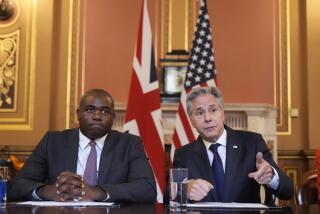U.S. Wants Embargo on Arms to Iran
- Share via
WASHINGTON — The Bush administration, trying to increase pressure on Iran, called Friday for an international embargo on sales of arms to Tehran until the regime agrees to suspend its nuclear program.
Undersecretary of State R. Nicholas Burns said the United States believed it was “time for countries to use their leverage,” including banning the sale of arms and “dual use” technologies that could be employed in Tehran’s nuclear program to generate electricity or make a weapon.
Burns singled out Russia, a longtime military supplier to Iran that has announced its plans to proceed with a $900-million sale of Tor M-1 antiaircraft missiles over U.S. objections.
“It doesn’t stand to reason that Russia would continue with the arms sale, particularly of the type envisioned, Tor missiles,” said Burns, the administration’s point man on the Iran issue. “Iran is a country that is violating every international agreement it’s made on the nuclear issue.... We hope and trust that the deal will not go forward.”
But Russian officials Friday repeated their intention to deliver the weapons, which they said were not the subject of any international sanctions.
“Currently, nothing is preventing the fulfillment of our obligations in the area of military and technical cooperation with Iran. This deals with all the agreements made,” Nikolai Spassky, deputy secretary of the Russian Security Council, told reporters in Moscow.
“As far as the future is concerned, military and technical cooperation with any country may be limited only after the U.N. Security Council imposes the relevant sanctions,” he said.
The Tor surface-to-air missiles are designed for use against aircraft and guided missiles at low and medium altitudes. They could theoretically be used against U.S. forces in the event of an American attack on Iran.
Russia also signaled its unwillingness to discuss possible U.N. Security Council sanctions against Iran pending a report from the International Atomic Energy Agency, the United Nations’ nuclear watchdog. On March 29, the Security Council demanded that Iran suspend enrichment and asked the IAEA to report back in 30 days. U.N. nuclear agency chief Mohamed ElBaradei is due to deliver a report by Friday on whether Iran is meeting the IAEA’s demands for a halt to uranium enrichment.
The U.S. has been pressing Russia and China to at least abstain on a resolution calling for targeted sanctions.
“Our position [on sanctions] is quite clear and does not require further clarification. At this stage, we consider it unproductive to discuss the issue of sanctions,” Spassky told The Times.
“When we get the report, we’ll review what’s written in it. Moreover, we will be reviewing concrete issues, concrete items -- not abstractly ‘Do we like Iran or not?’ or ‘What’s it doing with centrifuges?’ ” Spassky said. “The primary issue, the source of this whole story, is the issue of Iran’s failure to fulfill its obligations, the issue of doubts on the part of the IAEA about its past nuclear program.
“As soon as this dossier gets closed, the mechanisms of Iran’s normal IAEA membership can immediately be fully restored, as can the normal, full-fledged development of its peaceful nuclear program.”
Iran’s ambassador to the IAEA, Ali Asghar Soltanieh, speaking at an international security conference in Moscow, said there were no conditions under which Iran would be willing to give up its nuclear power program. He emphasized again that the program did not have a weapons component.
“You would be surprised if I said we have a common agreement with the United States, [but] I’m saying that Iran should not have nuclear weapons,” Soltanieh said. “But there should be a distinction. Iran will have nuclear technology for peaceful uses, and will never give up.”
He said Iran would be announcing bids in the next few weeks for construction over the next 20 years of two nuclear power plants capable of generating 20 megawatts of power.
“European or other potential suppliers are welcome for the bid,” he said.
*
Richter reported from Washington and Murphy from Moscow. Natasha Yefimova of The Times’ Moscow Bureau contributed to this report.
More to Read
Sign up for Essential California
The most important California stories and recommendations in your inbox every morning.
You may occasionally receive promotional content from the Los Angeles Times.











